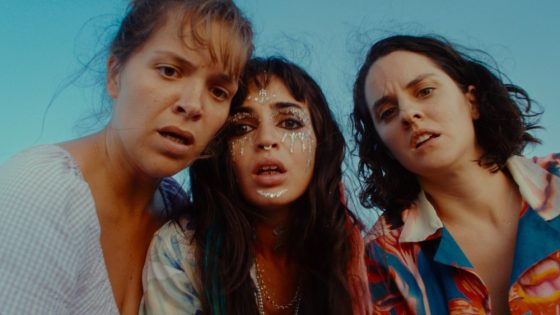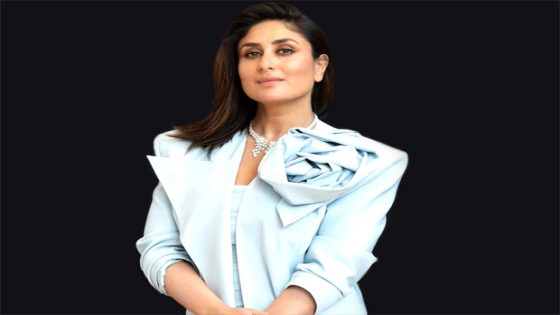Noemie Merlant’s sophomore feature “The Balconettes” plays as a raunchy horror-comedy with a greater social conscience. The film follows three roommates – an actress, played by Merlant, a camgirl played by “Dune: Part Two” breakout Souheila Yacoub and a frustrated writer played Sanda Condreanu – who are initially infatuated and eventually repelled by a lothario neighbor from across the yard. Exploring questions of coercion and consent with a healthy dose of blood and guts, “The Balconettes” wants to entertain and energize in equal measure.
Variety spoke with the filmmaker ahead of her film’s world premiere in Cannes.
How did this film come about?
Four years ago, I found myself escaping from a daily life that was suffocating. I went to live with women, with friends of mine, including Sanda Codreanu, who stars in the film. This was the first time I’d lived with other women, and the first time I’d experienced this intimacy over the course of a long period, lasting several months. It felt like a release, being able to discuss our desires, our traumas, our visions of the world. And within this sisterly environment, I realized that I could be more fully myself.
How so?
I saw that I was playing a role, playing a woman taught from childhood not to make noise, not to make waves. And then, all of a sudden, I felt free, so I wanted to explore that, even before I knew the story. I wanted to explore sisterhood, I wanted to explore sexual assault, and I wanted to film our bodies with a kind of gentle vulgarity that is often only granted to men. I find a form of truth and sincerity in such vulgarity, because our bodies speak through those taboos. This absurd humor is vital to my daily life with friends; it allows us to own our experiences, to appropriate and tell our own stories.
And that brought you to horror?
Right away, I felt the need for blood, gore, humor, and color, because that’s really my world. I grew up on “Ichi the Killer,” on Korean films like “Memories of Murder,” then “The Chaser” and “The Wailing.” Asian genre cinema, Tarantino, and Almodovar were all huge parts of my childhood and adolescence. In order to approach such subjects I absolutely had to use gore and humor to distance myself, to create a liberating and cathartic element.
‘The Balconettes’
Cannes Film Festival
You co-wrote with Celine Sciamma. How did that collaboration go?
We’ve stayed friends since “Portrait of a Lady on Fire” and have never stopped talking. Céline knows me so well that she offered to help on this, even if she wasn’t used to writing comedy. We worked together for nearly four years, starting by ping-ponging versions to one another, talking for hours, looking for ideas. She helped me strengthen the three characters, to affirm choices I didn’t dare make in order to make them exist as individuals, and not just as a collective. Céline brought a certain fluidity and poetry to the process.
Stylistically, “The Balconettes” is quite a bit removed from your previous film, “Mi Iubita, Mon Amour.”
I wanted to go over-the-top. I told the actors to think of themselves as comic-book characters, and followed a similar line for the costumes, colors and sets. This isn’t cinema verité; this doesn’t have the same realism as my previous film. Instead it’s a fairy-tale, a fable. A punk fable, to be sure. I often shot with a wide-angle lens in order to distort and to give the impression of being in a slightly fantastical world, playing with slow motion, and all these genre codes. The film needed to be rich on every level.
The film also wants to shatter taboos, shooting bodies in a very matter-of-fact way.
Between women, we have no hang-ups. When we look at each other, we say: What’s wrong with our breasts? Even today, on film sets, we have to hide them, to cover them up. I just can’t understand it. So I wanted to challenge the viewer in this respect. [Shooting a sequence where women parade topless] felt so good. The temperature was so hot that day, so it felt so right, both physically and symbolically. We were crying with emotion, because it felt like fantasy, like something that couldn’t actually be done in real life, whereas seeing shirtless men walking down the street in hot weather is commonplace. [At the same time] I couldn’t treat the human body too clinically, so I focused on a woman’s desire for an attractive, bare-chested man. Anyone can feel desire for another person, and if everyone’s in the clear, there’s no problem.
I wanted to have fun with it all, to show female characters who love sex and says so with no need for modesty or taboo. That’s just the way it is. That’s the same reason my character is an actress playing Marilyn Monroe, because I needed to depict Monroe in a new way, creating images of her with friends, laughing, sharing anxieties, and being completely free. It’s completely absurd, but it hits me in a visceral way.
Was it easier, in that sense, to be your own director?
Yes, of course there are things my character does that are quite tricky. It might have been more complicated to ask another actress, or I might have been more uncomfortable with the dynamics of hierarchy. At least with me, I know how far I can go. Of course, you lose time when wearing two hats. You have less time as a director and less time as an actress, but then, you also feel like you’re living the film from the inside. Sometimes it’s tiring, but it’s always extremely interesting. And of course it allows me to go further.
As it happens, the film will play at a festival where questions of MeToo are front-and-center.
I don’t know what will happen at Cannes, but it likely won’t change the wider problems. What I do know, and what I put in the film, is that woman are often afraid to call the police. The justice system doesn’t work in France, and you can see as much looking at the percentage of convictions against the number of sexual assault complaints filed. That’s where the problem lies. And so, for me, this is not a revenge movie; it’s about self-defense. And anyway, I don’t want to moralize, I want to open up a dialogue, using humor and horror codes to push a kind of catharsis. When we believe in ourselves, others will believe in us.

‘The Balconettes’
Cannes Film Festival
Source Agencies




